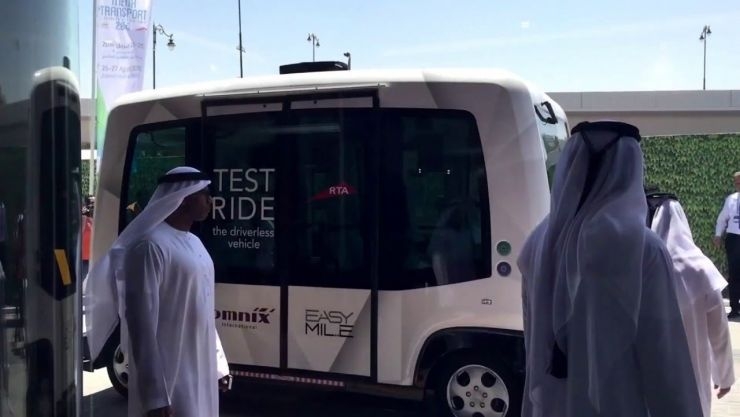
The Dubai Transit Authority announced that starting from September 1, a driverless car for passenger ferry will begin trial operation in downtown Dubai. This ferry car is the EZ10, a driverless bus produced by the French company EasyMile.
The car from EasyMile is a bus that is managed by multiple parties following the EU Framework for Research, Technology Development and Demonstration Activities Seventh Plan.
Like most unmanned vehicles, the EZ10 pure electric vehicle is equipped with a GPS positioning system, a laser sensor, and a camera. There is no steering wheel on the bus, and the satellites (GPS) and sensors can automatically travel in both directions along a specified route.
There is no artificial control device inside the EZ10. It is fully loaded with 12 people. 6 of them have seats, 6 people stand, and the cruising speed is 20km/h. The maximum speed can reach 40km/h. According to EasyMile, the EZ10 can maintain 14 hours of battery life at a time. It is only necessary to set the GPS route before running.
In 2015, EasyMile bravely took the first step in commercialization. The EZ10 driverless buses they produced were put into use. So far, tens of thousands of passengers have been shipped in France, Finland, Switzerland, the Netherlands, Greece, Spain, and Italy. EasyMile stated that it expects to have 100-200 EZ10s in use by 2017.
In August of this year, the unmanned bus also undertook a 10-day trial operation in the Meihama, Chiba City, Japan, where EasyMile and Japanese game company DeNA cooperated. Since the Japanese government did not allow other cars to go on the road, the bus performed very well on the pre-planned route. The end of the year will also be trial run in Australia.
During the operation, testers several kilometers away will monitor the unmanned buses 24 hours a day. If they want to stop the bus, they can also be remotely controlled.
Unmanned buses tested in Dubai, the rich are very interestedDubai has adopted a smart mobile solution to build a new smart city, so the trial run of the unmanned bus was jointly launched by Dubai Road Traffic Authority and Imal Real Estate.
Many countries only allow researchers to ride during the trial run, but all citizens and tourists can ride for free during the trial run in Dubai. The EZ10 will drive about 700 meters on the busiest Mohammed Bin Rashid Avenue in downtown Dubai. It will shuttle between the intersection of the financial center and the Vida Hotel. The EZ10 has a top speed of 40km/h and a cruise speed of about 25km/h. It is still relatively challenging for pedestrians and bicycle-intensive areas.
The EZ10's smart system takes about 90 minutes to familiarize with the map, remember the route, and run it without anyone's interference. The bus is equipped with a 4 kilometre long, 2 metre wide 15 kV battery. Although it can run for more than a dozen hours without charging, it is still operated in Dubai for 4 hours.
The EZ10 is equipped with two 360-degree laser sensors and GPS sensors on the roof and is equipped with a visual sensor around it. The camera has a 270-degree field of vision and can monitor road conditions within 40 meters.
Mattar Al Tayer, Chairman of the Executive Board of the Road and Transport Authority of Dubai, stated: “The EZ10 travels along a prescribed route and can easily be handled in the face of emergencies. Unmanned buses are equipped with all the necessary safety conditions to control buses in designated programs. Driving on the route, sensors and smart technology can ensure that the bus avoids any obstacles to collision."
Dubai plans to make 25% of urban transport capacity as driverless cars by 2030. In the past August, Dubai's "Declaration" reported that 70% of UAE consumers are willing to experience driverless cars, 47% of consumers are ready to buy driverless cars, of which 72% of consumers are willing to pay 5,000 US dollars or More.
At present, it is not difficult for unmanned vehicles to get on the road. The real problem lies in the complex road conditions and the cost of high-precision identification, both of which have a natural advantage in Dubai.
On the one hand, Dubai’s luxury cars are everywhere, and it is also one of the countries with the highest rate of car ownership in the world, with an average of 2.3 cars per family.
On the other hand, Dubai’s control over traffic is very strict. There have been news that Dubai’s luxury cars have been abandoned because the ticket is too high. In Dubai, there is an average of one camera per one kilometer, and one camera takes a 6,000 dirhams (approximately RMB 11,000) for speeding back. Then the consequences of speeding can be imagined. Dubai guarantees safety in this way while also providing a good environment for the complex driving conditions of autonomous driving.
Under the premise of a relatively simple traffic environment, government support and the insurmountable purchasing power of people in other countries are very strong advantages. Once an autonomous vehicle is on the road, it is likely to develop rapidly and on a large scale.
From this perspective, there are enough wealthy individuals in Dubai who are willing to buy unmanned vehicles. They are more suitable for unmanned development than other countries.
Please pay attention to the "New Ideas Drive" section of Lei Feng Net (search "Lei Feng Net" public number attention) and add "New Ideas Drive" to the public number on WeChat.
